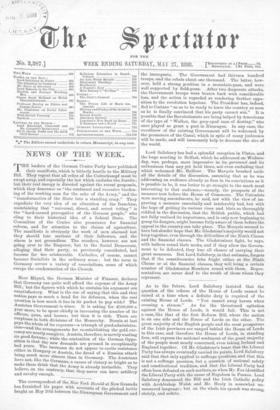Lord Salisbury has had a splendid reception in Ulster, and
the huge meeting in Belfast, which he addressed on Wednes- day, was, perhaps, more impressive in its personnel and its enthusiasm than any yet held there, not even excluding that which welcomed Mr. Balfour. The Marquis brushed aside all the details of the discussion, assuming that as he was addressing an. audience already as firm in its convictions as it is possible to be, it was better to go straight to the mark most interesting to that audience,—namely, the prospects of the measure now before the House of Commons. The Unionists were moving amendments, he said, not with the view of im- proving a measure essentially and intolerably bad, but with the hope of getting its various vices and blots so thoroughly riddled in the discussion, that the British public, which had not fully realised its importance, and is only now beginning to grasp its dangers, might become fully aware of them before the appeal to the country can take place. The Marquis seemed to have but slender hope that Mr. Gla,dstone's majority would not keep together, even through the difficulties of the Ninth Clause and the financial clauses. The Gladstonians fight, he says, with halters round their necks, and if they allow the Govern- ment to be defeated, they lose all chance of carrying their great measures. Bat Lord Salisbury, in. that estimate, forgets that if the constituencies take fright either at the Ninth Clause or at the financial clauses, they will bring a certain number of Gladstonian Members round with them. Repre- sentatives are never deaf to the wrath of those whom they represent.


































